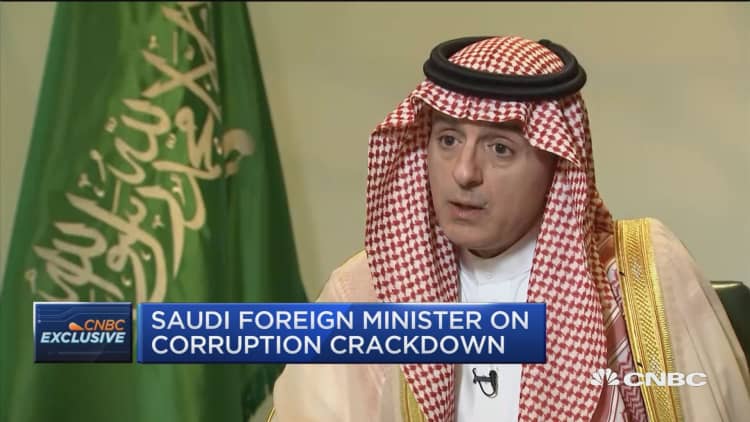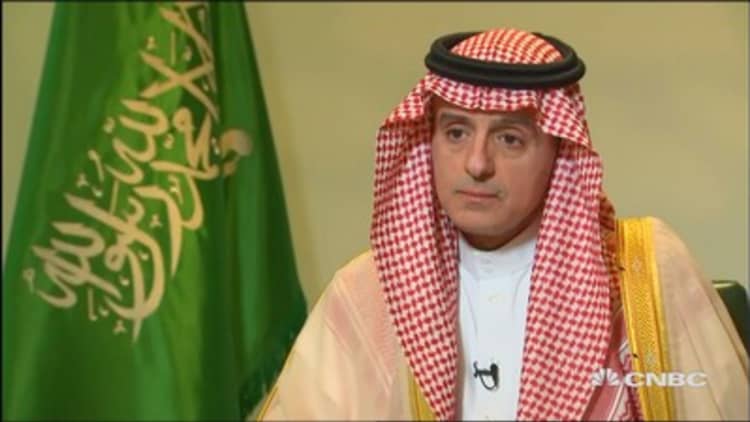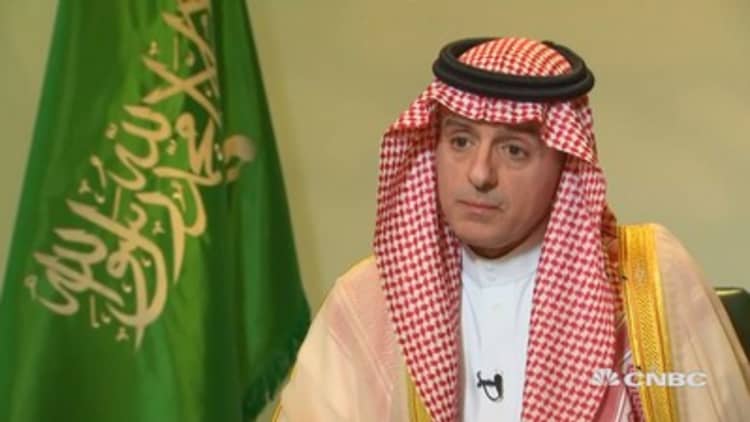
Saudi Arabia's foreign minister urged the international community to slap fresh sanctions against Iran Thursday, accusing its arch-regional rival of supporting terrorism.
"We would like to see sanctions on Iran for its support of terrorism and sanctions on Iran for violating the ballistic missile resolutions of the United Nations," Adel Al-Jubeir, Saudi minister of foreign affairs, told CNBC Thursday.
When asked whether Saudi Arabia was headed for a direct conflict with Iran, Al-Jubeir replied, "We hope not."
The Kingdom's foreign minister went on to say the most effective way of dealing with Iran would be for the international community to hold Tehran accountable for "fixing" the nuclear agreement, supporting terrorism and for its ballistic missile program.

Ballistic missile attack
Saudi Arabia blames Iran for allegedly being behind a ballistic missile attack on Saturday. The missile, which was fired by Houthi rebels in Yemen, was intercepted in flight near Riyadh's airport.
In response, Iran's United Nations Ambassador, Gholamali Khoshrou, described the allegations as "unfounded," Tasnim News Agency reported. Tehran also denied arming the Houthi movement, which has fought a Saudi-led coalition supporting Yemen's government since 2015.
The ongoing civil war in Yemen is akin to a proxy war between Saudi Arabia and Iran and their competing ideologies of Sunni and Shia Islam, respectively. While Sunni-ruled Saudi Arabia backs the government of President Abdrabbuh Mansour Hadi, its rival Iran backs the pro-Shia Houthi movement loyal to the country's former president Ali Abdulla Saleh.
On Monday, Saudi Arabia's Crown Prince Mohammed bin Salman said Iran's alleged actions may be considered "an act of war," state media reported.

Hezbollah 'hijacked' Lebanese system
Further to the apparent proxy war between Saudi Arabia and Iran in Yemen, the latest Middle Eastern country in danger of becoming an epicenter of hostile relations between the two arch-rivals is Lebanon.
Lebanon's Prime Minister Saad Hariri, a long-term Sunni ally of Saudi Arabia, stunned the world by resigning at the weekend, citing assassination threats and blaming Iran for interference in Lebanon.
On Thursday, Saudi Arabia warned its citizens against travelling to Lebanon and asked those in the country to leave as soon as possible, the kingdom's official news agency (SPA) quoted an official source in the Foreign Ministry as saying, Reuters reported.
"Due to the circumstances in the Lebanese Republic, the kingdom asks its citizens who are visiting or residing" in the country to leave it as soon as possible, the source added.
Al-Jubeir described the situation in Lebanon as "unfortunate." He went on to accuse Hezbollah of "hijacking the system" and putting "roadblocks" in front of Hariri at every opportunity.
Speaking from Riyadh, Hariri criticized Iran last weekend, and its Lebanese ally Hezbollah, for igniting conflict in the region. Tehran later rejected the remarks of Beirut's outgoing leader, according to reports.
Saudi Gulf Affairs Minister Thamer al-Sabhan said Monday the Lebanese government would "be dealt with as a government declaring war on Saudi Arabia" and made a thinly-veiled threat of further action, Reuters reported, citing comments from an Al-Arabiya TV interview with Sabhan.
Trump waded into the escalating geopolitical uncertainty on Monday evening, offering encouragement to Saudi Arabia. The U.S. president tweeted that the Kingdom's leaders know "exactly what they are doing."
Nuclear deal
Al-Jubeir said Thursday that the landmark nuclear deal between Iran and six world powers was "weak," especially given Tehran would be capable of assembling a bomb "within weeks."
He added he would like to see international agencies carry out a "much more robust" job when conducting inspections in Iran.
The 2015 nuclear deal was a signature foreign policy achievement of Barack Obama's presidency. The agreement lifted tough economic sanctions on Iran in return for limitations to the country's nuclear energy program.
Last month, President Donald Trump announced he would not rectify the deal and instead asked U.S. lawmakers to toughen the agreement.
European leaders and other supporters of the seven-nation pact have since jumped to the defense of Iran in an attempt to safeguard the landmark deal's future.
—CNBC's Holly Ellyatt and Reuters contributed to this article.



